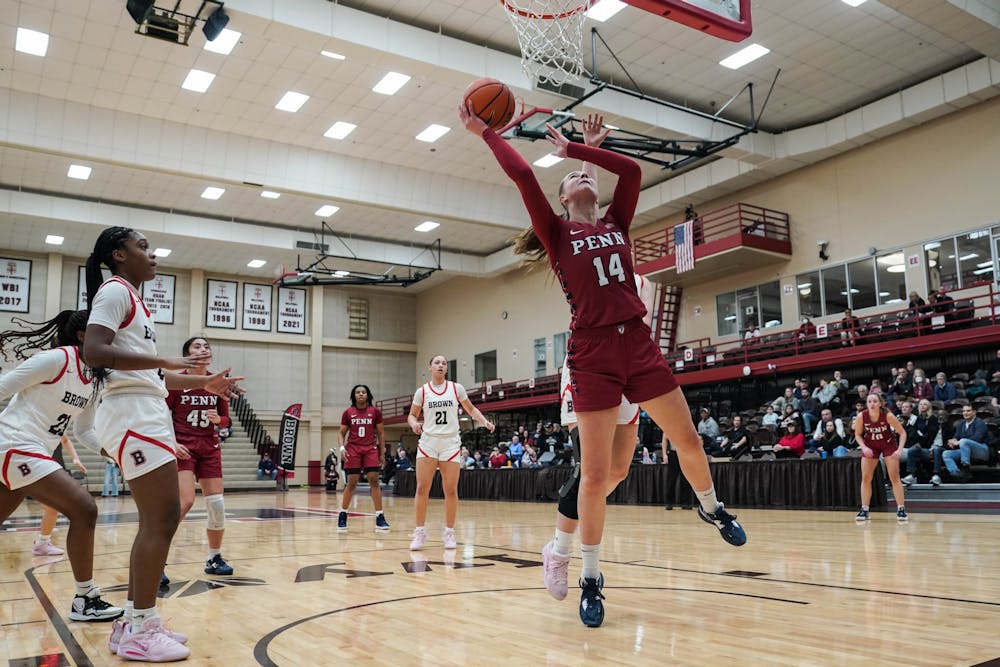
There was plenty to like about Penn women’s basketball’s weekend road trip: a double-digit win over Yale, a new three-point record-holder in senior guard Kayla Padilla, a clinched spot in the Ivy League tournament.
But all of those shining lights were dimmed by the team’s 68-59 defeat at Brown, a team which the Quakers beat by 21 points earlier this season, and had just three Ivy League wins prior to Saturday. It was a let down in many ways, but most notably in how clearly the loss exposed many of Penn’s most critical weaknesses.
In many ways, Penn’s win over the Bulldogs served as a gleaming example of the team's strengths. Padilla led the way with 25 points and four assists, and four starters shot 50% or higher from the field. Many of Penn’s most impressive performances have been marked by excellent ball movement, including an 11-game win streak in which four different players led the team in scoring multiple times.
That is the team Penn aspires to be, and it is the team they will need to be in order to compete for an Ivy League title. But the team’s loss to Brown was reminiscent of some of their less inspiring performances — games when the offense stagnates around a few players, and the opposing defense suffocates them as a result.
Padilla, junior forward Floor Toonders and senior guard Sydnei Caldwell scored 76% of Penn’s points on Saturday, and Padilla was the only Quaker capable of creating off the dribble in the second half. Penn’s blowout losses to Columbia and Princeton — the current No. 1 and No. 2 seeds in the Ivy League — were similar stories. Three players accounted for 84% of Quaker scoring against Columbia, and only three players scored at all outside of garbage time against Princeton.
“I thought the ball really stuck,” coach Mike McLaughlin said of the team’s lack of ball movement against Brown.
Penn’s offense is also predicated on three-pointers, another area of disparity between the weekend’s games. Penn connected on just 29% of their triples against Brown, a far cry from their 50% clip against Yale. Living is easy when the long-range shots are falling, but the margin for error is much slimmer when performances like Saturday’s crop up.
The Quakers are 7-1 in Ivy League play when they shoot over 35% from three, and just 1-3 when they go under. Generating offense on poor shooting days has been a difficult task, which is a puzzle they will need to solve in order to ensure a bad day from beyond during the tournament does not doom their season.
Toonders helped keep Penn’s offense afloat during the first half in Providence, R.I., converting off of several smooth post feeds and ultimately finishing the game with 14 points, her highest in Ivy play.
But Toonders’ scoring petered out in the second half, a half that McLaughlin said Penn “did not come out of the gate with the same energy,” as they did during the first. The Quakers ultimately squandered a 12-point halftime lead, and more concerningly, they failed to consistently implement a potential solution to their three-point problem.
“I think this was just a wake-up call,” Padilla said of the loss to Brown. “When we face adversity, that’s the biggest time we have to come together, and I don’t think we really showed that tonight. Especially going into the tournament, where there will be challenges for sure, it’s coming together collectively and just pushing against the wall and doing our best.”
When the Quakers play the way they did against Yale, spreading the rock and hitting their threes, they can compete with anyone. And with their place in the postseason secured, Penn can hope that when the tournament rolls around, they are at their best.
But hope is not a strategy. To maximize their chance at a title, the Quakers will have to find ways to win when their typical exploits fall flat. It is a challenging path to chart, but one Penn will have to plot before it is too late.
The Daily Pennsylvanian is an independent, student-run newspaper. Please consider making a donation to support the coverage that shapes the University. Your generosity ensures a future of strong journalism at Penn.
Donate







